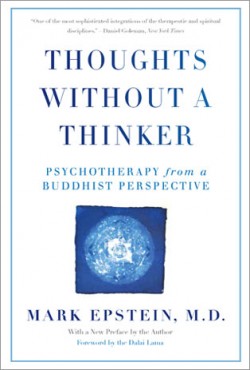Thoughts Without A Thinker
Full Title: Thoughts Without A Thinker: Psychotherapy from a Buddhist Perspective
Author / Editor: Mark Epstein
Publisher: Basic Book, 1995
Review © Metapsychology Vol. 17, No. 36
Reviewer: Christian Perring
Originally published in 1995 and now republished with a new preface, Thoughts without a Thinker has been enormously influential in the understanding of modern psychotherapy and the relevance of mindfulness. Metapsychology published a review in 1999 by Thomas Cobb. Epstein has published several books since then, and they tend to overlap very much with this one. His basic approach is to focus on the methods and some of the main ideas of psychoanalysis and to show how there are similarities with Buddhist teachings, and further, how those Buddhist ideas can help and improve psychoanalytic practice. Given that traditional psychoanalysis is now practiced very little, it might seem that Epstein’s approach would be of extremely limited interest — only for those who are trained in psychoanalysis, using free association as the main method in sessions, and practicing long term therapy. These days psychotherapy tends to be more interactive between therapist and client, and free association is rarely used. Furthermore, most health insurance tends to discourage the use of long-term psychotherapy, so that is also rare. Modern psychotherapy is much more inclined towards cognitive behavioral methods focused on specific problems, and tends to be relatively short in duration. Nevertheless, mindfulness and meditation are increasingly relevant to psychotherapy as it becomes clear that Buddhist traditions have long explored the ability to become aware of the flow of thoughts and feelings in a person, and the ability to simply acknowledge and be with that flow without it spiraling out of control.
Epstein’s book is divided into three sections: the first on the Buddha’s psychology of mind, the second on meditation, and the third on therapy. Initially the Buddhist approaches may seem unhelpfully metaphorical: the Wheel of Life has six realms: the Human Realm, the Animal Realm, the Hell Realm, the Realm of Hungry Ghosts, the Realm of Jealous Gods, and the God Realm. Epstein reads these psychologically, and so he uses psychoanalysis to examine imbalance, self-estrangement, cravings, fears, compulsions, difficulties with drawing boundaries with other people, and feelings of emptiness and worthlessness. He emphasizes that often those trained in Eastern approaches find Western problems hard to understand because they are often so bound up in feelings of low self-esteem and self-hate, which are rare conditions in the East. Nevertheless, Eastern insights are very helpful; they recommend self-observation and self-acceptance. Rather than building up a new self through therapy, a person simply comes to reduce suffering by giving up many struggles. Epstein explains,
“In the Buddhist view, a realized being has realized her own lack of true self. She is present by virtue of her absence and can function effectively and spontaneously in the world precisely because of her ability to see the self as already broken.” (72)
Epstein argues that the psychoanalyst Donald Winnicott showed similar suspicion of the idea of a true self, although this is not the standard reading of Winnicott’s work. Nevertheless, it is an extremely provocative and helpful idea, and one does not have to be a committed postmodernist to have reservations about the rhetoric of being real, being authentic, or discovering one’s true self. The explorations of Buddhist ideas here provide ways of embracing emptiness and fracture without falling into nihilism.
The subsequent sections of the book round out the ideas set out in the first, exploring ideas of self-awareness and self-change. This is far from being a self-help book, and it does not provide any particular techniques to achieve enlightenment, but it is relevant to any practice of self-understanding. So Thoughts without a Thinker remains a vital text which can be useful to a wide variety of psychotherapeutic approaches.
© 2013 Christian Perring
Christian Perring, Professor of Philosophy, Dowling College, New York

